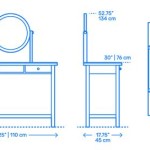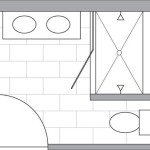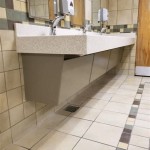Replacing Under Bathroom Sink Plumbing: A Comprehensive Guide
Under-sink plumbing plays a crucial role in a bathroom's functionality. When these pipes or fixtures fail, it can lead to leaks, clogs, and other plumbing emergencies. Replacing under bathroom sink plumbing can be a daunting task, but with the right tools and knowledge, you can tackle it yourself and save on professional plumbing costs.
1. Gather Materials and Tools
Before starting, gather the necessary materials and tools. This includes a new sink drain assembly, supply lines, shut-off valves, plumbers putty, Teflon tape, pipe wrench, adjustable wrench, basin wrench, and bucket.
2. Shut Off Water Supply
Turn off the water supply valves located under the sink. If there are no valves, you'll need to turn off the main water supply to your house. Open the faucet to release any remaining water in the lines.
3. Remove the Old Drain Assembly
Place the bucket under the sink to catch any water or debris. Using the adjustable wrench, loosen the slip nut that connects the drain assembly to the sink. Remove the old drain assembly by hand or with the basin wrench.
4. Clean and Seal the Drain Hole
Clean the sink drain hole and surrounding area with a damp cloth. Apply a bead of plumbers putty around the base of the new drain assembly. This helps create a watertight seal.
5. Install the New Drain Assembly
Insert the new drain assembly into the sink drain hole and hand-tighten the slip nut. Use the adjustable wrench to further tighten the nut, but avoid overtightening.
6. Replace the Supply Lines
Disconnect the old supply lines from the shutoff valves and faucet. Wrap Teflon tape around the threads of the new supply lines and connect them to the shut-off valves and faucet. Hand-tighten the connections and use the pipe wrench to fully tighten.
7. Test the Plumbing
Turn on the water supply valves and open the faucet to test the plumbing. Check for any leaks at the connections. If there are leaks, tighten the connections further or apply additional Teflon tape or plumber's putty.
8. Troubleshooting Common Issues
During the replacement process, you may encounter some common issues:
- Leaks: Check and tighten all connections, replace washers or gaskets, or apply plumbers putty to seal any leaks.
- Clogs: Remove the drain stopper and use a drain cleaner or snake to remove any blockages.
- Loose faucet: Tighten the faucet's mounting nuts or replace the washer behind the handle.
- Water hammer: Install water hammer arrestors on the supply lines to prevent water from banging in the pipes.
Conclusion
Replacing under bathroom sink plumbing is a manageable DIY project with the right preparation and tools. By following these steps and troubleshooting any issues that arise, you can restore your sink to proper functionality and save on plumbing costs.

Plumbing Repairs How To Repair Fix It Diy Install Bathroom Sink

How To Install A Pipe From Sink Drain Wall Ehow
How To Install Bathroom Sink Drain Queen Bee Of Honey Dos
How To Install Bathroom Sink Drain Queen Bee Of Honey Dos

Bathroom Sink Plumbing Installation Diy Montreal

Replace A Trap And Add Cleanout Fine Homebuilding

How To Replace A Sink Stopper Quick And Simple Home Repair

Bathroom Sink Plumbing Installation Diy Montreal

How To Replace A Rusty Sink Drain Howtolou Com

How To Retrieve An Item Dropped Down The Sink Drain In 2024 Bathroom Plumbing Replace
Related Posts







